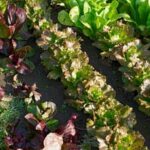Are you looking for container vegetable gardening ideas UK? As a gardener in the UK, you may be limited by space or have limited access to traditional gardening areas. However, container vegetable gardening offers a convenient and versatile solution for growing your own fresh produce right at home. In this article, we will explore the benefits of container vegetable gardening specifically tailored to the UK climate, as well as provide tips and ideas for getting started.
Container vegetable gardening is an excellent option for UK gardeners who may have limited outdoor space. Whether you live in a small apartment with just a balcony or have a small backyard, containers can be placed virtually anywhere to grow vegetables. The versatility of container gardening allows you to move your plants around to follow the sunlight or protect them from harsh weather conditions. Additionally, it allows for greater control over the soil quality and drainage for optimal plant growth.
With the ever-changing weather in the UK, selecting the right containers plays a crucial role in successful vegetable gardening. In this article, we will discuss how to choose the best containers that will withstand the fluctuating climate and provide tips on size, material, and drainage requirements.
Stay tuned for expert advice on ideal vegetables for container gardening in the UK, soil and fertilizer tips, sunlight and watering needs guidance, pest and disease management strategies, as well as maintenance guidelines for a thriving container vegetable garden.
Selecting the Right Containers
When it comes to container vegetable gardening ideas in the UK, choosing the right containers is crucial for the success of your garden. Here are some tips for selecting the best containers for vegetable gardening in the UK climate:
- Size: Ensure that your containers are large enough to accommodate the root systems of your chosen vegetables. Consider the mature size of the plants and select containers with adequate space for their growth.
- Material: Opt for containers made from durable materials such as plastic, fiberglass, or cedar wood. These materials can withstand the variable weather conditions in the UK and provide good insulation for plant roots.
- Drainage: Proper drainage is essential for preventing waterlogged soil, which can lead to root rot. Look for containers with drainage holes at the bottom, or be prepared to drill your own if necessary.
It’s important to keep these factors in mind when selecting containers for your vegetable garden, as they can directly impact the health and productivity of your plants.
Remember that container gardening offers flexibility and convenience, making it an ideal option for gardeners with limited outdoor space. By carefully choosing the right containers, you can create a thriving vegetable garden no matter how much room you have available.
Ideal Vegetables for Container Gardening in the UK
When it comes to container vegetable gardening ideas in the UK, selecting the right vegetables is crucial for a successful and abundant harvest. Fortunately, there are numerous vegetable varieties that thrive in the UK climate and are well-suited for container gardening. One of the key benefits of container gardening is the ability to grow a wide range of vegetables even in limited spaces, making it an ideal option for many UK gardeners.
Some popular vegetables that are ideal for container gardening in the UK include tomatoes, peppers, lettuce, radishes, carrots, and herbs such as basil and parsley. These vegetables not only adapt well to being grown in containers but also provide a bountiful yield when given the proper care and attention. For beginner gardeners, it is recommended to start with easy-to-grow vegetables like salad greens and herbs, which can be very rewarding and require minimal maintenance.
| Vegetable | Best Container Size |
|---|---|
| Tomatoes | 5 gallons or larger |
| Lettuce | 8-10 inches deep |
| Basil | 6 inches minimum diameter |
Soil and Fertilizer Tips
When it comes to container vegetable gardening in the UK, selecting the right soil mix is crucial for the success of your plants. The most important factor to consider when choosing soil for container gardening is its ability to retain moisture while still permitting proper drainage. Look for a high-quality potting mix that is specifically formulated for vegetables, as these mixes are designed to provide the necessary nutrients and aeration for healthy plant growth.
In addition to using a good potting mix, it’s also essential to regularly fertilize your container vegetables. Since container plants have limited access to soil nutrients, they rely on regular fertilization to thrive. Consider using a balanced, slow-release fertilizer or an organic option such as compost or fish emulsion. Follow the instructions on the fertilizer package carefully and be mindful not to over-fertilize, as this can lead to nutrient imbalances in the soil.
Choosing the Right Soil Mix
When selecting a soil mix for your container vegetable garden in the UK, look for options that provide good drainage and aeration while still retaining moisture. Avoid using standard garden soil, as it tends to compact easily in containers and can hinder root growth. Instead, opt for a lightweight potting mix that contains organic materials such as peat moss or coconut coir. These materials help improve water retention without becoming waterlogged.
Fertilizing Container Vegetables
In addition to using a quality soil mix, fertilizing your container vegetables is crucial for their overall health and productivity. Consider incorporating organic fertilizers into your routine, as they not only provide essential nutrients but also contribute to long-term soil health. Organic options like compost tea and manure can help maintain a balanced ecosystem within your containers while promoting strong, vibrant plant growth.
By paying close attention to both your soil selection and fertilization practices, you can ensure that your container vegetables receive all necessary nutrients for optimal growth and yield in your UK garden.
Sunlight and Watering Needs
When it comes to container vegetable gardening ideas in the UK, one of the most important factors to consider is the sunlight and watering needs of the plants. In the UK climate, sunlight can be limited, so it’s crucial to position your containers in a location where they can receive optimal sunlight exposure.
Vegetables typically require at least 6 hours of direct sunlight per day, so choose a spot in your garden or patio that allows for this level of sun exposure. Additionally, monitor the movement of the sun throughout the day to ensure your containers are placed in an area that receives consistent sunlight.
In terms of watering, container vegetables have different water requirements compared to traditional garden beds. The soil in containers tends to dry out faster, especially during warmer months, so it’s important to establish a proper watering routine. Generally, container vegetables will need to be watered more frequently than their counterparts in the ground.
It’s advisable to water them early in the morning or late in the evening to prevent evaporation and ensure that the water reaches the roots effectively. To determine when your plants need water, simply check the top inch of soil – if it feels dry to the touch, it’s time to water.
By paying close attention to sunlight exposure and watering needs, you can ensure that your container vegetables thrive in the UK climate. Proper positioning and watering techniques will contribute significantly to healthy plant growth and bountiful harvests from your container vegetable garden. With these essential tips in mind, you can enjoy cultivating an array of vegetables even in limited spaces such as balconies or small outdoor areas.
Pests and Disease Management
Container vegetable gardening in the UK comes with its share of challenges, including managing pests and diseases that can affect the health and growth of your plants. However, with the right strategies and knowledge, you can effectively prevent and address these issues without the need for harmful chemicals.
Preventing Pests
One of the best ways to manage pests in your container vegetable garden is to prevent them from becoming a problem in the first place. Regularly inspecting your plants for any signs of pest damage or infestation is essential. You can also introduce beneficial insects such as ladybugs and lacewings, which naturally prey on common garden pests like aphids and caterpillars.
Organic Pest Control
Should you encounter pest issues in your container vegetable garden, it’s important to explore organic methods for control. For instance, using insecticidal soap or neem oil can effectively target common garden pests without posing harm to beneficial insects or the environment. Additionally, creating barriers such as row covers can physically protect your plants from pests.
Disease Management
In addition to pest management, it’s crucial to be proactive about preventing diseases that can affect your vegetables. This includes practicing good hygiene by cleaning your containers between plantings and avoiding overwatering, which can lead to fungal infections. Using disease-resistant vegetable varieties tailored for container growing in the UK climate can also minimize the risk of plant diseases.
By implementing these strategies for managing pests and diseases in your container vegetable garden, you can ensure the health and productivity of your plants while maintaining an environmentally friendly approach to gardening in the UK.
Harvesting and Maintenance
Container vegetable gardening in the UK offers the opportunity to enjoy homegrown produce, even in limited outdoor spaces. Maintaining and harvesting from your container garden requires some attention to detail, but the rewards are well worth it. Here are some tips to ensure a fruitful harvest and the continued health of your container plants.
When it comes to harvesting your vegetables, timing is crucial. Make sure you are familiar with the specific harvesting times for each type of vegetable you are growing. For example, tomatoes should be harvested when they reach their full color and firmness, while leafy greens like lettuce can be harvested as soon as they reach a desirable size.
Regular maintenance of your container garden is essential for healthy plant growth. This includes monitoring soil moisture levels and watering when necessary, as containers tend to dry out more quickly than traditional garden beds. Additionally, keep an eye on any signs of disease or pests that may affect your plants. Regularly inspecting your plants can help catch issues early on and prevent them from spreading.
To prolong the lifespan of both your plants and containers, consider implementing crop rotation in subsequent growing seasons. Crop rotation can help minimize disease build-up in the soil and prevent nutrient depletion. Additionally, routinely cleaning and sanitizing your containers between planting cycles can contribute to healthier plant growth.
By following these tips for harvesting and maintenance, UK gardeners can enjoy a bountiful harvest from their container vegetable gardens while ensuring the long-term health of their plants.
| Harvesting Tips | Maintenance Tips |
|---|---|
| Harvest at the right time based on specific vegetables | Monitor soil moisture levels regularly |
| Consider implementing crop rotation for subsequent growing seasons | Routinely clean and sanitize containers between planting cycles |
| Familiarize yourself with specific harvesting times for various vegetables | Inspect plants regularly for signs of disease or pests |
Conclusion
In conclusion, container vegetable gardening is an excellent option for UK gardeners looking to make the most of limited space and enjoy fresh, homegrown produce. The benefits of this gardening method are numerous, including convenience, versatility, and the ability to control growing conditions. By utilizing containers, individuals can successfully cultivate a variety of vegetables, even in urban or small outdoor spaces. With the right guidance and resources, anyone can create a thriving container vegetable garden in the UK.
When selecting containers for vegetable gardening in the UK climate, it’s crucial to consider factors such as size, material, and drainage. Choosing the appropriate containers will contribute to optimal plant growth and yield. Additionally, selecting the right soil mix and fertilizing accordingly are essential for healthy vegetable growth in containers. Proper sunlight exposure and watering techniques also play key roles in ensuring successful container gardening.
By following the advice provided in this article on container vegetable gardening ideas UK, individuals can effectively manage common pests and diseases using organic methods without resorting to harmful chemicals. Furthermore, maintenance guidelines will help prolong the lifespan of both plants and containers. With a little effort and dedication, readers can start their own container vegetable garden with confidence, knowing they have all the necessary information at their fingertips.
In sum, container vegetable gardening is a practical and rewarding way for UK gardeners to grow their own produce at home. Whether you’re a beginner or seasoned gardener, there are plenty of options available when it comes to choosing suitable vegetables for container gardening. With the proper knowledge and attention to detail regarding planting, watering, pests control measures among more aspects your garden will surely thrive.
Frequently Asked Questions
What Vegetables Grow Well Together in a Container?
Some vegetables that grow well together in a container include lettuce and radishes, tomatoes and basil, and carrots and onions. These pairings can complement each other’s growth needs and maximize the use of space.
What Vegetables Are Good to Grow in Containers?
Many vegetables are good to grow in containers, including tomatoes, peppers, lettuce, spinach, kale, radishes, carrots, and herbs like basil and parsley. These plants thrive in the confined space of a container with the right care.
What Is the Easiest Vegetable to Grow in a Container?
The easiest vegetable to grow in a container is probably lettuce. Lettuce has shallow roots, making it well-suited for a container. It also doesn’t require too much maintenance and can be harvested multiple times throughout its growing season.

If you’re looking to get into vegetable gardening, or are just looking for some tips on how to make your current garden better, then you’ve come to the right place! My name is Ethel and I have been gardening for years. In this blog, I’m going to share with you some of my best tips on how to create a successful vegetable garden.





